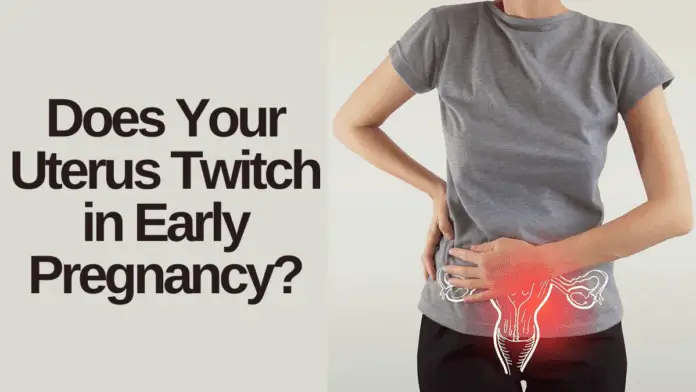
Recognizing the early signs of pregnancy can be an exciting yet confusing time for many women. While some symptoms are well-known, such as missed periods and morning sickness, others may be less familiar. One such symptom is uterus twitching, which can leave many expecting mothers wondering if it’s a normal occurrence or something to be concerned about. In this article, we will explore the phenomenon of uterus twitching as an early pregnancy symptom, providing you with comprehensive information to help you understand what it means and when to seek medical advice.
What is Uterus Twitching?
Uterus twitching refers to involuntary contractions or movements of the uterus that some women may experience in early pregnancy. These sensations can feel like gentle flutters or twitches and are often mistaken for gas or digestive issues.
How Does Uterus Twitching Differ from Other Symptoms?
Unlike typical cramping associated with menstruation, uterus twitching is usually mild and may occur sporadically. It can be more noticeable when a woman is at rest or lying down. Understanding this distinction can help alleviate anxiety for those who experience it.
Uterus Twitching as an Early Pregnancy Symptom
During early pregnancy, a woman’s body undergoes significant hormonal changes that can affect various organs, including the uterus. Uterus twitching is often attributed to these hormonal fluctuations, particularly the increase in progesterone levels, which helps maintain the pregnancy.
The Role of Hormones
- Progesterone: This hormone relaxes smooth muscles, including those in the uterus, and helps prevent contractions that could lead to miscarriage.
- Estrogen: As pregnancy progresses, estrogen levels rise, further influencing uterine activity and potentially leading to sensations of twitching.
Other Common Early Pregnancy Symptoms
In addition to uterus twitching, there are several other symptoms that women may experience during early pregnancy:
- Missed Period: One of the first signs that prompts many women to take a pregnancy test.
- Nausea and Vomiting (Morning Sickness): Often begins around the sixth week of pregnancy and can last until the end of the first trimester.
- Breast Tenderness: Hormonal changes can lead to swollen and sensitive breasts.
- Fatigue: Increased progesterone levels can cause significant tiredness.
- Frequent Urination: As the uterus expands, it puts pressure on the bladder.
The Science Behind Uterus Twitching
Understanding the physiological reasons behind uterus twitching can provide reassurance for expectant mothers.
Physiological Reasons for Uterus Twitching
- Muscle Contractions: The uterus is a muscle, and like any muscle in the body, it can contract involuntarily. These contractions may become more noticeable as the body adjusts to pregnancy.
- Increased Blood Flow: Early pregnancy leads to increased blood flow to the pelvic region, which can heighten sensitivity in that area.
When to Expect Uterus Twitching
Most women may begin to notice uterus twitching around the 6th to 8th week of pregnancy, although this can vary significantly from person to person. Some may feel it earlier or later depending on individual differences in sensitivity and hormonal changes.
Distinguishing Uterus Twitching from Other Symptoms
It’s essential to differentiate uterus twitching from other sensations that might occur during early pregnancy:
- Cramping: While mild cramping can be normal, intense pain or cramping accompanied by bleeding may indicate a problem.
- Quickening: This term refers to feeling fetal movements later in pregnancy (around 16-25 weeks), which is different from early twitching sensations.
Signs That May Indicate a Need for Medical Attention
If you experience any of the following symptoms alongside uterus twitching, it’s essential to consult a healthcare provider:
- Severe abdominal pain
- Heavy bleeding
- Dizziness or faintness
- Persistent nausea or vomiting
Managing Uterus Twitching Discomfort
For many women, uterus twitching does not require medical intervention. However, if you’re experiencing discomfort associated with this symptom, consider these tips:
- Stay Hydrated: Drink plenty of water throughout the day.
- Practice Relaxation Techniques: Stress management through yoga or meditation can help ease discomfort.
- Gentle Exercise: Light physical activity like walking can promote circulation and alleviate tension.
Seeking Medical Advice
While most cases of uterus twitching are benign, it’s always wise to consult with a healthcare provider if you have concerns. They can provide personalized advice based on your medical history and current situation.
When to Consult a Healthcare Provider
If you notice any alarming symptoms or if your uterus twitching becomes more frequent or intense, do not hesitate to reach out for professional guidance. Your healthcare provider will assess your situation and determine if further evaluation is necessary.
Conclusion
In summary, uterus twitching is an early pregnancy symptom that many women experience due to hormonal changes and physiological adjustments within their bodies. While it is generally considered normal, being aware of your body’s signals is crucial. If you find yourself experiencing unusual symptoms or have concerns about your health during early pregnancy, always prioritize consulting with a healthcare professional. Monitoring your symptoms and seeking support when needed will help ensure a healthy pregnancy journey ahead.
Recognizing uterus twitching as an early pregnancy symptom allows expectant mothers to better understand their bodies during this transformative time. Embrace this unique experience while staying informed about what’s normal and when it’s time to seek help!
Related Article: Getting Ready for Pregnancy Checklist












[…] plantar warts can be uncomfortable and unsightly, they are generally not considered dangerous during pregnancy. The strains of HPV that cause plantar warts are not highly contagious, so you may not necessarily […]